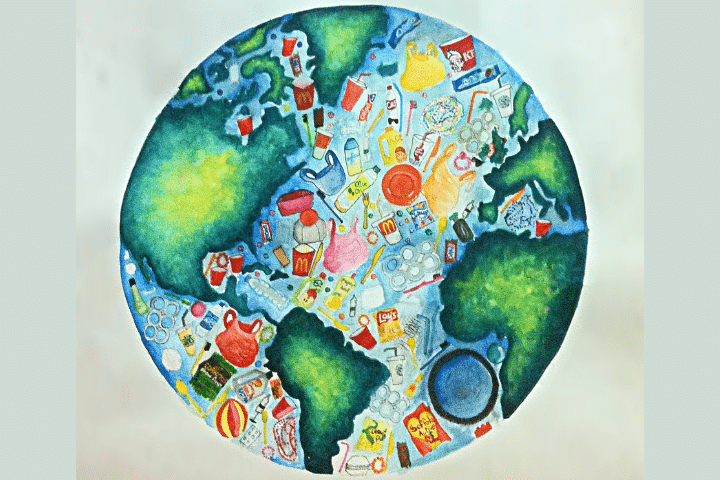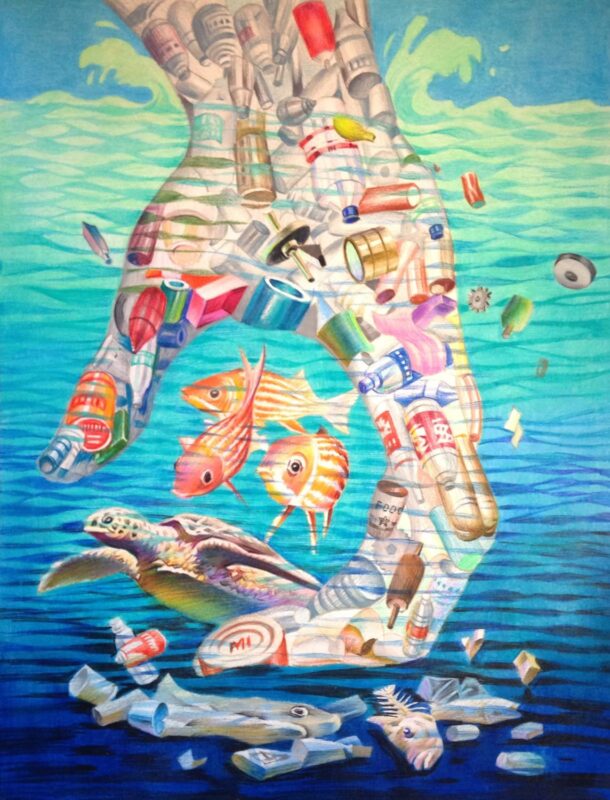
Sea of Solutions: The Connection Between Plastic Pollution and Climate Change
September 25, 2023By Sarah Robison, 2023 Future Blue Youth Council member
Featured Image: “Plastic Planet” by Vyusti Kumaar (India)
Plastic is all around us. In our homes, at our schools, in the workplace, and unfortunately, a lot of it ends up in the ocean. Whether you’ve seen plastic wrappers on the sidewalk, bottle caps on a nearby beach, plastic bottles just outside of a recycling bin, or plastic bags floating in the breeze on the street, you’ve experienced plastic pollution first-hand. Consequently, the presence of microplastics and plastic debris poses a growing concern to environmental health and negatively affects our planet by degrading the integrity of our ecosystem over time.
Did you know that plastic production and pollution is connected to our climate crisis? The climate crisis is caused by increased amounts of carbon emissions and harmful greenhouse gasses like hydrofluorocarbons, fluorinated gasses, nitrous oxide, and methane released from global transportation, commercial industries, electricity usage, and other sources involving combustion, burning, or heating. These pollutants become trapped in our atmosphere and result in a greenhouse effect that causes our planet to warm and our ocean to absorb the excess heat. The production and distribution of plastic products contributes to the greenhouse effect. Most of today’s plastic is made from hydrocarbons, a component of fossil fuels such as natural gas and crude oil. These are synthetic or naturally occurring polymers that provide elasticity for shaping plastic into all sorts of products and packaging. Annually, over five-hundred million tons of carbon dioxide is produced by plastics alone. Facilities that produce and distribute plastic require large amounts of energy input and in turn have a large carbon footprint on our planet.
Plastic pollution can accelerate the process of global warming by inhibiting the efficient sequestration of carbon dioxide by the ocean. When microplastics are distributed throughout our seas, they can interfere with heat absorption. Additionally, plastic debris can block light from penetrating the euphotic zone. Photosynthetic organisms, like phytoplankton, need this sunlight to undergo photosynthesis which removes carbon from our oceans. As photosynthetic organisms are unable to sequester this carbon, the excess carbon causes a chemical reaction which makes the ocean more acidic. Ocean acidification leads to an increase in the number of coral bleaching events that affect marine populations on a large scale. This has become an increasingly important issue that needs to be discussed and addressed in conjunction with excessive plastic production, single-use littering, throw-away culture, and ultimately, the acceleration of climate change. It’s estimated that eleven million metric tons of plastic waste enters the ocean each year, which directly impacts our efforts to slow climate change.
Climate change and plastic pollution are interconnected because of the crucial impact plastic wastes have on the disruption of the ocean’s natural processes which contribute to the warming of the atmosphere. Today’s plastic production and widespread distribution imprints a substantial carbon footprint on our environment and ultimately contributes to the severity of the climate crisis we are currently experiencing.

Untitled Art by Roselene Chen (California)
Plastic pollution is a real-world environmental issue that connects with climate change to negatively affect our planet’s ocean, beaches, waterways, and atmosphere every day. Plastic production and pollution poses a large threat to the overall slowing of climate change and the creation of a healthy ocean environment in the future. So, how can we prevent it from happening? If global reliance on plastics is reduced, the production and distribution of plastic products and their packaging can be lessened and consequently, their accompanying carbon footprint that contributes to climate change can be minimized.
There is hope! Daily actions to reduce your reliance on plastic to avoid pollution and directly support the slowing of climate change:
- Elect to use reusable cloth bags at the grocery store. These have less environmental impact over time because they are reused rather than being disposed after one use. Even paper bags are also a better option to consider.
- Consider an alternative to single-use bottled water for fresh drinking water. The use of a water filter rather than single-use bottled water can prevent unnecessary plastic production and reduce overall waste.
- Say “no” to plastic straws and disposable silverware. There are eco-conscious alternatives to plastic straws, like silicone, glass, and stainless steel. Bamboo alternatives are available in many regions to take on-the-go utensils to school or work.
- Be sure any trash you accumulate is properly disposed of and that any plastic waste, that cannot be safely reused, is recycled. Less than nine percent of plastics tossed in the recycling bin end up getting repurposed into new products. That means ninety-one percent of your plastic bottles, straws, bags, wrappers, and other disposable products have the potential to surpass waste sorting, head to the trash, and end up in natural waters. If you notice trash on a beach, please properly dispose of it or ask yourself if you can safely reuse the material, perhaps in a project of your own. Be responsible for helping keep local parks and shores clean!
- Seek product packaging that is biodegradable, composed of recycled paper products, or made of bioplastic. These materials have a significantly smaller environmental impact than traditional plastic packaging. Reducing your plastic reliance in this way makes a difference in our fight against climate change and further pollution.
- Reach out to companies from which you often purchase items in an effort to reduce their reliance on plastic and synthetic materials. Hearing from their consumers and supporters can have a positive influence on their decision to consider greener alternatives in the future which can improve climate resilience in the long term.
- Share your knowledge with others to raise awareness. Using your voice is a powerful tool in advocating for change and taking a stand for the planet. Tell your friends and family about plastic pollution and climate change. Sharing this article is a great start to educating others in these important issues!
More involvement opportunities:
- Beach clean-ups can make a small but mighty positive impact! If you notice trash on a beach, please properly dispose of it or safely reuse the material, perhaps for a project of your own. Be responsible for helping keep local parks and shores clean! Several communities and geographical locations host group beach clean-ups as an opportunity to join others in the fight against plastic pollution and prevent trash from ending up in the ocean to contribute to climate change.
- Consider supporting plastic bag bans in your area, state, or country. By supporting plastic bag bans, you’re helping to prevent the production of additional plastic and aiding in the prevention of plastic pollution. Your support can prevent further acceleration of climate change and support the preservation of some marine species from near extinction. Read about Bow Seat Fellowship Grantee, Bye Bye Plastic Bags.
- Join a student-led initiative. Youth have a powerful voice in environmental activism. Most student-led initiatives work to keep our seas clean and regularly advocate for climate justice, such as the CARE Club which welcomes members from across the globe to engage in individual environmental actions and impactful group projects.
Be part of the solution by taking daily actions toward positive change and becoming actively involved in environmental advocacy and ocean health efforts.
